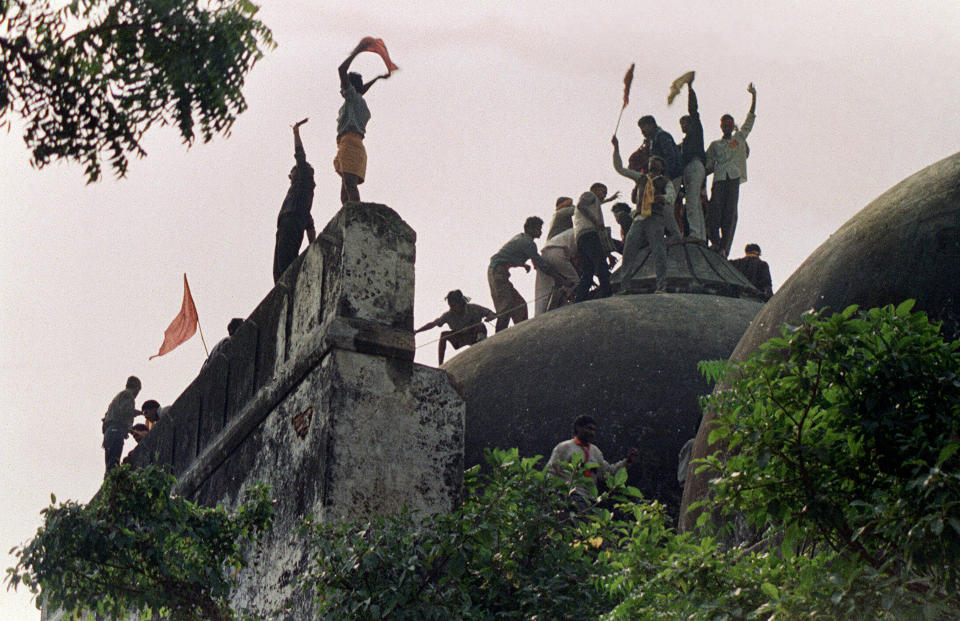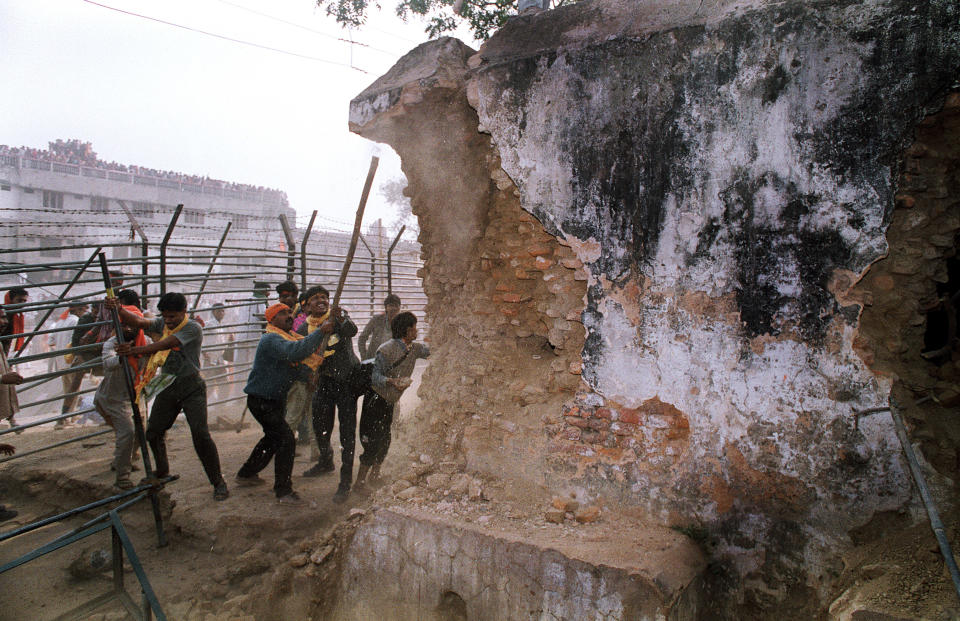Babri Masjid demolition verdict: All accused acquitted

Almost 28 years after the Babri Masjid was razed by a mob in Uttar Pradesh’s Ayodhya town, a special Central Bureau of Investigation court in Lucknow on Wednesday acquitted all 32 accused, including Bharatiya Janata Party leaders Lal Krishna Advani, Murli Manohar Joshi and Uma Bharti, due to lack of evidence.
Judge SK Yadav said that the demolition of the Babri Masjid was not pre-planned and there is not enough evidence against the accused. All the accused in the case have been acquitted.
The court ruled that there was no conclusive proof against the accused. “They have been acquitted for lack of evidence,” defence lawyer KK Mishra said.
As many as 26 of the 32 accused were present in the special court when the judgment was pronounced.
While BJP veterans skipped the proceedings, Vinay Katiyar, Dharamdas, Vedanti, Lallu Singh, Champat Rai, and Pawan Pandey were among the accused present in the court today.
All 26 accused appeared before the court around 10.30 am. Outside the court, there was heavy police deployment and barricading. Media persons were not allowed to enter the court premises.
The verdict comes almost 28 years after the Babri Masjid was demolished, leading to communal disharmony and riots in the country.
#BabriVerdict – All the accused have been acquitted. The incident was not pre-planned. The leaders present there were trying to stop the mob and not incite them: Lawyer, Manish Kumar Tripathi. pic.twitter.com/DAkfkjeqjp
— CNNNews18 (@CNNnews18) September 30, 2020
Bharatiya Janata Party veterans Lal Krishna Advani, Murli Manohar Joshi, Uma Bharti and Kalyan Singh, all accused in the Babri mosque demolition case, joined through video conferencing on Wednesday at the time of delivery of verdict in the matter.
#BabriDemolitionCase verdict today: Of the 49 accused, 32 are alive today. The accused in the case include BJP leaders LK Advani, Murli Manohar Joshi, former ministers Uma Bharti and Kalyan Singh, among others.https://t.co/fEjbwEycUa pic.twitter.com/j4dlTORUrP
— The Indian Express (@IndianExpress) September 30, 2020
Reports, however, suggest that former deputy prime minister LK Advani will appear before the court through video-conferencing from Delhi.
Their advocate KK Mishra also said that Ram Janmabhoomi Nyas chief, Nritya Gopal Das, too is unlikely to be present in the CBI special court here.
Of the other accused Vinay Katiyar, Dharamdas, Vedanti, Lallu Singh, Champat Rai and Pawan Pandey have reached Lucknow ahead of the pronouncement of the verdict. The case relates to the razing of the disputed structure in Ayodhya on December 6, 1992.
The Supreme Court had fixed September 30 as the deadline for the trial court to pronounce its judgement in the nearly three-decade old case.
The 32 accused include former deputy prime minister Advani, former Union ministers Joshi and Uma Bharti, former Uttar Pradesh chief minister Kalyan Singh, during whose tenure the structure was pulled down, besides Vinay Katiyar and Sadhvi Rithambhara.
Champat Rai, the general secretary of the trust in charge of constructing the Ram temple, is also among those accused.
With the Supreme Court setting August 31 as the deadline and later extending it by a month for the CBI court to give its verdict, the trial court started day-to-day hearing to complete the task in time.
The central agency produced 351 witnesses and 600 documents as evidence before the court. Charges were framed against 48 people, but 17 have died during the course of trial.
The trial under the serious criminal conspiracy charges commenced against them after having been dropped by the trial court in 2001. The verdict was upheld by the Allahabad High Court in 2010, but the apex court ordered restoration of the conspiracy charge against them on April 19, 2017.
The top court ordered daily hearing in the high profile case and directed the special judge to conclude it in two years.
#BabriDemolitionCase | Almost 28 years after the demolition of the Babri Masjid, a Special CBI Court will Wednesday pronounce its judgment in the conspiracy case.
Follow LIVE updates https://t.co/m6AYQGkvM5— The Indian Express (@IndianExpress) September 30, 2020
The charge of conspiracy is in addition to the existing charges against them for promoting enmity between different groups on grounds of religion for which they are already facing trial.
The accused are also facing charges of having made assertions 'prejudicial to national integration and injuring or defiling a place of worship'.
The other charges against them include indulging in 'deliberate and malicious' acts intended to outrage religious feelings, uttering statements leading to public mischief, rioting and unlawful assembly.
The CBI argued that the accused conspired and instigated 'kar sevaks' to demolish the 16th century mosque. But the accused pleaded innocence maintaining that there is no evidence to prove their guilt and claimed they were implicated by the then Congress government at the Centre as a political vendetta.
The Babri Masjid was demolished in December 1992 by 'kar sevaks' who claimed that the mosque in Ayodhya was built on the site of an ancient Ram temple.

In a significant judgment last year, the Supreme Court allotted the disputed site in Ayodhya for construction of a Ram temple, while calling the demolition of the mosque a violation of the rule of law.
An alternative five-acre site was marked in the city for building a mosque.
Before the 2017 verdict of the apex court, two sets of cases were being heard in Lucknow and Raebareli.

 Yahoo Sports
Yahoo Sports 